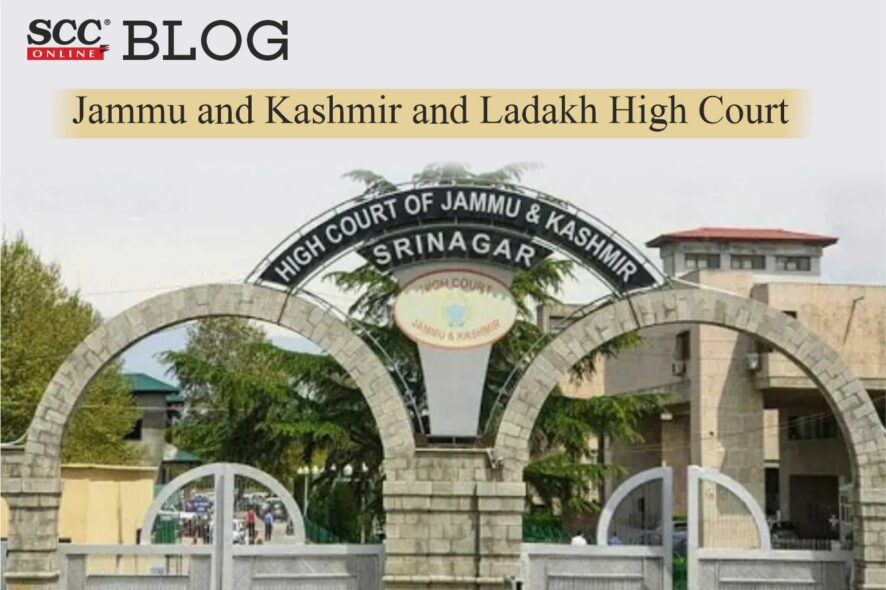Jammu and Kashmir and Ladakh High Court: While deciding the instant petition wherein a person’s engagement as Rehbar-e-Khel was cancelled as he joined his duty after a lapse of 21 days as he was not physically present in India at the time, the Bench of Rahul Bharti, J., observed that that expression “Application of Mind” is not meant as a matter of usage for ritual sake, but is a living principle of law out of which only an administrative/ judicial/quasi-judicial decision, must bear its natural delivery and not come by caesarean mode. “The legal principle of Application of Mind in its operational level, envisages the full view, comprehension and understanding of the facts of a given case, without any edit regarding which a decision in return is warranted in law from the decision maker”.
Facts: The petitioner in pursuance to a J&K Government policy embodied in Govt. Order no. 141-Edu (YSS) of 2017 dated 27-10-2017, aiming to address the needs of physical fitness of the school children in the government schools, was appointed as Rehbar-e-Khel. For the purpose of competing in the selection process, the petitioner had come from Oman where he had been then working as a Cashier in a hotel since February, 2017 and had gone back after competing in the selection process and was still staying in Oman when the selection list came to be published and his order of engagement dated 27-02-2019 came into picture. In terms of the requirements enlisted in the said composite order of engagement, it was stated that the selected candidate shall join his/her duties within a period of 21 days.
As soon as the afore-stated order came, the petitioner started the process to getting back to India and to join her service. The petitioner, acting through his father, also submitted his joining related documents before the District Youth Services & Sports Officer, Doda. The petitioner came to report for duty on 26-03-2019 after he had reached back India a day before. Thus, instead of joining duty within 21 days, the petitioner had joined duty on 26th day from the day next to the date of issuance of engagement order dated 27-02-2019.
However, on the complaint of a wait-listed candidate who complained that the petitioner’s appointment was illegal as he was not present in India at the time of his appointment, the Youth Services & Sports Department, Jammu, via Order no. DG/YSS/Estt/11112-16 dated 01-01-2020, cancelled the petitioner’s engagement as Rehbar-e-Khel. The petitioner thus challenged this impugned order before the High Court.
Observations: Upon perusal of the facts and the impugned order, the Court made the following observations—
-
It was observed that the condition of joining within 21 days from the date of the issuance of engagement order was not a mandatory condition. Thus, the period of 21 days was to be reckoned as extendable for any genuine contingency which could be there at any point of time of joining, which in the present case was with the petitioner.
-
The Court further observed that the petitioner came and reported himself for joining on 26-03-2019 and was allowed to join without any objection from the Authorities, and the delay in joining stood condoned by the Authorities themselves.
-
The Court pointed out that the Director General, Youth Services & Sports Department, Jammu acted with a mechanical mindset least sensitive to the factual and legal situation of the case, the legal situation being that the condition for joining did not carry a disqualification rider.
-
The Court scathingly pointed out that the instant case is yet another recurring scenario, engaging the time and energy of the constitutional courts in dealing with cases of habitual disposition on the part of administrative and public officials /authorities in the matter of passing orders, bearing legal effects and civil consequences, which more often than not fail to withstand scrutiny at first sight of the Rules of Natural Justice and Rule of Law, thereby leaving the real situation meant to be dealt with by a prudent decision.
-
The Court also pointed out that the Supreme Court in its various decisions, had painstakingly laid down the importance of the Principles of Natural Justice, only for the public authorities to forget them again and again “(…)And till that time comes, the constitutional courts will keep on infusing the jurisprudential wisdom into the psyche of the public institutions and its functionaries that expression “Application of Mind” is not meant as a matter of usage for ritual sake”.
-
It was observed that any public authority (judicial, quasi-judicial or administrative) which knows that it is meant to decide matters, must know that there is and will be an ever-present institutional demand to make a decision, which if being questioned by any aggrieved person, is able to self-exhibit its factuality and legality so evidently, so as to test and tax the wit of the person in questioning the given decision. “This is what is and will be meant in real sense and spirit an act of application of mind on the part of the maker of the judgment/decision. A judgment/decision must commend itself for ready acceptance making its rejection a demanding task for the person willing to question it and for the person/authority meant to examine the question posed to challenge it”.
Decision: With the afore-stated observations, the Court declared the impugned order as unfair and arbitrary and held that the petitioner is entitled to continue with his engagement as Rehbar-e-Khel, without any break having intervened, with all consequential engagement dues and benefits.
[Shailender Parihar v. Sarmad Hafeez, WP(C) No. 275/2020, decided on 18-10-2022]
Advocates who appeared in this case :
Petitioner Through Achal Sharma, Advocate;
Respondent Through K. D. S. Kotwal, Dy. AG.
*Sucheta Sarkar, Editorial Assistant has prepared this brief.







